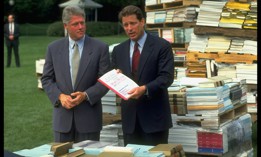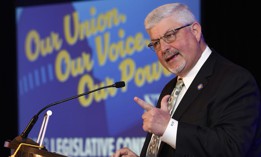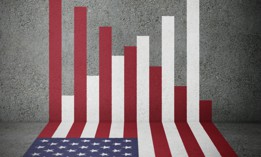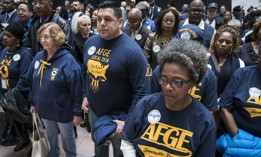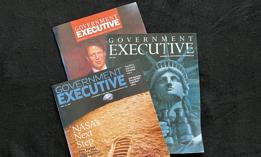In Bolton’s case, testimony from numerous other witnesses has identified the former national security adviser as uncomfortable with Trump’s efforts on Ukraine—the “drug deal” between Sondland and Mulvaney, as he reportedly called it. The former National Security Council staffer Tim Morrison testified that Bolton directed him to draft a memo encouraging Trump to release the aid to Ukraine, though Bolton ultimately never presented the memo to the president. And Morrison also testified that Bolton met one-on-one with Trump about the withholding of aid. Bolton seems almost uniquely well positioned to speak to Trump’s state of mind on the issue. So, too, is Kupperman, who took over as acting national security adviser after Bolton departed the job on September 10—the day before the White House finally released the aid.
Viewpoint: If the Witnesses Could Exonerate Trump, Why Aren’t They Testifying?
Trump’s defenders suggest that White House aides could exculpate the president—but the evidence suggests otherwise.
Speaking with George Stephanopoulos on ABC this weekend, Representative Matt Gaetz—one of President Donald Trump’s most relentlessly enthusiastic congressional supporters—had an unexpected suggestion for how the president should proceed in the impeachment inquiry. Mick Mulvaney, the director of the Office of Management and Budget and acting White House chief of staff, should testify before Congress, Gaetz argued—along with Secretary of State Mike Pompeo and perhaps even the president’s personal lawyer Rudy Giuliani. All three men have so far refused to cooperate with House requests for information. But, said Gaetz, “I think it would inure to the president’s advantage to have people testify who could exculpate him.”
This is the kind of thing one can say only if one has a certain confidence that the witnesses in question will not, in fact, testify. And Gaetz himself seemed to hedge, indicating that the need to preserve executive privilege made the question of Mulvaney’s and Pompeo’s testimony “a tough balance for the president.”
Whatever spin these three men might put on their interactions with the president, the facts that might be elicited from them, given the wealth of information about their activities in the Ukraine scandal, are most unlikely to exculpate Trump. And it’s not only them: There’s also Trump’s former national-security adviser John Bolton, who has publicly suggested that the White House harbors “fear of what I may say.” The last time Mulvaney opened his mouth at a public press conference, he openly admitted that military aid to Ukraine was held up, in part, pending “investigations.” Giuliani, meanwhile, seems to blab major admissions every time a journalist gets him on the phone—or every time he inadvertently butt-dials a journalist. And that’s before the former New York City mayor starts tweeting.
These are not people the president should want Congress to hear from.
What remains of Trump’s defense is only a question of his intent in doing the things that nobody disputes he did. There is no question that Trump had a conversation with Ukrainian President Volodymyr Zelensky in which he asked for an announcement of investigations into the Biden family and into a nutty conspiracy theory about Ukrainian possession of a Democratic server from the 2016 election. There is also no question that he froze aid to Ukraine. And there is no question, either, that his administration communicated to the Ukrainians that these two issues were tied—that the aid wouldn’t flow until the investigations were announced.
The questions on which Trump’s defense turns are, first, whether the president meant for these investigations to be targeted efforts to harm political opponents or whether his request reflected earnest anti-corruption concerns on his part; and, second, whether the linkage between aid and investigations reflected Trump’s own wishes and orders or whether it reflected freelancing by underlings.
A handful of witnesses are in a position to speak directly to Trump’s intent—all of whom have refused to testify. Though Trump said recently that Giuliani “wants to go before Congress,” the president’s lawyer has so far failed to show up in front of the House or the Senate. The House has not subpoenaed Pompeo’s testimony, but the Intelligence Committee report on impeachment writes that he “has not produced a single document sought by [Congress] and has not indicated any intent to do so going forward.” Mulvaney has outright defied a subpoena. After Bolton indicated that he wouldn’t comply with a subpoena absent a court order to do so, the House withdrew its demand for his testimony. The same is true of Bolton’s former deputy Charles Kupperman, who took the unusual step of asking the courts to weigh in on whether he had an obligation to comply.
Giuliani, of course, appears to have been in communication with the president about his activities in Ukraine: Trump told the team of administration officials working on Ukraine issues to “talk to Rudy,” several witnesses have testified. Pompeo was listening to the July 25 phone call with Zelensky in which Trump made his demands of Ukraine, was kept in the loop by Ambassador to the European Union Gordon Sondland about Sondland’s efforts to make the quid pro quo materialize, and met with the president about the withholding of aid to Ukraine. And according to the testimony of multiple witnesses, Mulvaney seems to have been directly involved in placing the hold on aid at the president’s request.
NEXT STORY: Performance Data Has Value Only When It's Used







